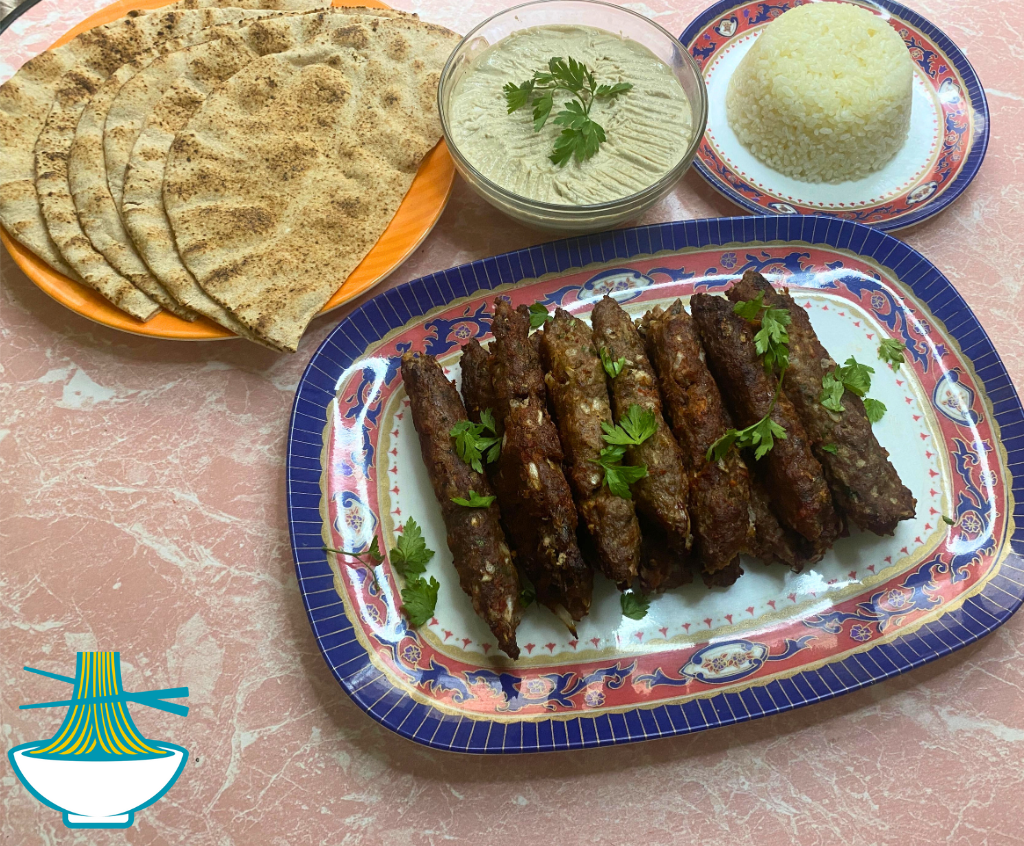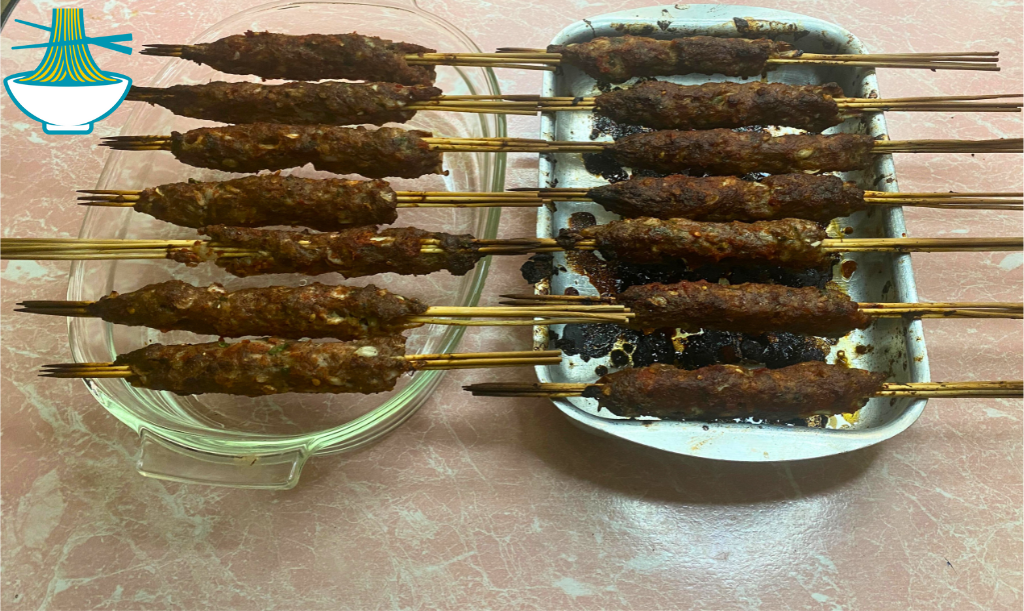Indulge your taste buds in a culinary journey with our savory Kofta Al-Haty recipe. This delectable dish is a perfect blend of minced meat, aromatic spices, and a touch of finesse. Whether you are a seasoned chef or a cooking enthusiast, this step-by-step guide will lead you to Kofta Al-Haty perfection.
To watch the cooking video, click on the link: Kofta Al-Haty - Easy and Delicious Grilled Meat Kofta Recipe

Ingredients:
1-1/2 kg minced meat
2-1/2 tsp salt
3-Assorted spices to taste
4-1/2 tsp black pepper
5-100g fresh parsley (or equivalent to a small bunch)
6-2 large white onions, grated and drained
7-1 tbsp starch
8-1 tsp baking powder
For the Sauce:
1-Onion water (reserved from grated onions)
2-2 tbsp tomato juice or sauce
3-1 tsp salt
4-1/2 tsp black pepper
5-1/2 tsp garlic powder
6-1 tbsp vinegar
For Grilling Aroma:
1-Charcoal
2-1/2 tsp ghee
Garnish:
1-Fresh parsley
Note: Quantities can be adjusted according to preference.

Method
Customize Your ExperienceBefore we dive into the intricacies of the recipe, it's essential to note that this culinary masterpiece allows for personalization. Adjust the quantities according to your preferences and amplify the flavors to suit your taste.
The Ingredients UnveiledLet's unravel the culinary magic. Start with half a kilogram of premium minced meat, the canvas for our delicious creation. Sprinkle in half a teaspoon of salt and a measured amount of spices, allowing you to tailor the seasoning to your liking.
A Symphony of FlavorsAs the journey continues, introduce half a teaspoon of black pepper, followed by the vibrant addition of 100 grams of fresh parsley. The melody intensifies with the inclusion of two large grated and drained white onions, ensuring a harmonious blend of textures.
The Secret ElixirUnlock the secrets of this recipe by reserving the onion water, a hidden gem for later use. Harness the power of a tablespoon of starch and a teaspoon of baking powder to elevate the texture and consistency of your kebabs.
Culinary AlchemyCombine these elements with precision, creating a tantalizing mixture that will form the heart of your savory kebabs. Allow the flavors to dance together, creating a symphony that will tantalize your taste buds.
The Art of ShapingShape your culinary creation into delightful meatballs, then let them rest in the refrigerator for 20 to 30 minutes. This brief interlude intensifies the flavors and ensures a succulent end result.
Crafting the KebabsAs the anticipation builds, take the chilled meat and craft it onto skewers, forming a visual feast. Arrange them on a tray with finesse, preparing for the journey into the oven.
A Flavorful BathPrepare the sauce by combining onion water, tomato juice, salt, black pepper, garlic powder, and a dash of vinegar. Let the ingredients merge into a tantalizing elixir that will coat your kebabs with flavor.
Oven SymphonyPlace the kebabs in the oven, accompanied by a tray of boiling water beneath, creating an environment of succulence. Let the aromas permeate as the kebabs cook to perfection over the next half-hour.
The Grand FinaleAs the kebabs emerge from the oven, tantalize your senses by adding a hint of grilled aroma. Follow our unique method using charcoal, ghee, and foil to elevate the flavor profile.
To watch the cooking video, click on the link: Kofta Al-Haty - Easy and Delicious Grilled Meat Kofta Recipe

Nutrition Value:
1/2 kg minced meat:
- Calories: Approximately 1200 kcal
- Fat: Approximately 80g
- Carbohydrates: 0g
- Sodium: Approximately 1000mg
Benefits: Rich in protein, iron, zinc, and B vitamins essential for energy metabolism and muscle function.
1/2 tsp salt:
- Calories: 0 kcal
- Fat: 0g
- Carbohydrates: 0g
- Sodium: Approximately 1200mg
Benefits: Sodium is essential for fluid balance and nerve function, but should be consumed in moderation.
Assorted spices to taste:
benefits depend on the specific spices used but can include antioxidants, anti-inflammatory properties, and various vitamins and minerals.
1/2 tsp black pepper:
- Calories: Approximately 3 kcal
- Fat: 0g
- Carbohydrates: 0.7g
- Sodium: Approximately 1mg
Benefits: Contains antioxidants and may aid digestion.
100g fresh parsley:
- Calories: Approximately 60 kcal
- Fat: 1g
- Carbohydrates: 11g
- Sodium: Approximately 80mg
Benefits: High in vitamin K, vitamin C, and antioxidants; supports bone health and immune function.
2 large white onions, grated and drained:
- Calories: Approximately 100 kcal
- Fat: 0g
- Carbohydrates: 24g
- Sodium: Approximately 10mg
Benefits: Good source of vitamin C, fiber, and antioxidants; may support heart health.
1 tbsp starch:
- Calories: Approximately 30 kcal
- Fat: 0g
- Carbohydrates: 7g
- Sodium: Approximately 1mg
Benefits: Provides energy; may contribute to satiety.
1 tsp baking powder:
- Calories: Approximately 2 kcal
- Fat: 0g
- Carbohydrates: 0.5g
- Sodium: Approximately 500mg
Benefits: Acts as a leavening agent in baking.
For the Sauce:
Onion water (reserved from grated onions):
benefits: depend on the amount of water retained but may include some vitamins and minerals from the onions.
2 tbsp tomato juice or sauce:
- Calories: Approximately 20 kcal
- Fat: 0g
- Carbohydrates: 4g
- Sodium: Approximately 200mg
Benefits: Contains lycopene, vitamin C, and potassium; supports heart health.
1 tsp salt:
- Calories: 0 kcal
- Fat: 0g
- Carbohydrates: 0g
- Sodium: Approximately 2300mg
Benefits: Sodium for fluid balance, but consume in moderation.
1/2 tsp black pepper:
- Calories: Approximately 3 kcal
- Fat: 0g
- Carbohydrates: 0.7g
- Sodium: Approximately 1mg
Benefits: Antioxidant properties.
1/2 tsp garlic powder:
- Calories: Approximately 5 kcal
- Fat: 0g
- Carbohydrates: 1g
- Sodium: Approximately 1mg
Benefits: May have antibacterial and antiviral properties.
1 tbsp vinegar:
- Calories: Approximately 3 kcal
- Fat: 0g
- Carbohydrates: 0g
- Sodium: Approximately 0mg
Benefits: May aid digestion; contains acetic acid.
For Grilling Aroma:
Charcoal:
- Provides a smoky flavor; no significant nutritional value.
1/2 tsp ghee:
- Calories: Approximately 20 kcal
- Fat: 2g
- Carbohydrates: 0g
- Sodium: Approximately 5mg
Benefits: Source of healthy fats; adds flavor to the grilled dish.
Garnish:
Fresh parsley:
benefits: similar to those mentioned for fresh parsley above.


Comments